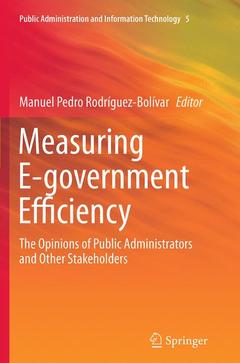Description
Measuring E-government Efficiency, Softcover reprint of the original 1st ed. 2014
The Opinions of Public Administrators and Other Stakeholders
Public Administration and Information Technology Series, Vol. 5
Coordinator: Rodríguez-Bolívar Manuel Pedro
Language: English
Subject for Measuring E-government Efficiency:
Publication date: 08-2016
Support: Print on demand
Publication date: 03-2014
285 p. · 15.5x23.5 cm · Hardback
Description
/li>Contents
/li>Comment
/li>
E-government has the potential to improve public services, information transparency, and the engagement of civic participation of the public sector management. This book analyzes the achievement of expectations created by public managers, policy-makers, and stakeholders with regard to the implementation of e-government policies and applications. It also tries to determine whether e-government applications have been introduced as a fad or according to real demands from citizenry and if efforts within e-government have been effective. This book investigates how public managers and policy-makers imagine e-government policies and the impact of those policies on their management and decision-making process through the engagement of citizenry. It is also discusses whether e-government policies are merely procedural improvements that strictly introduce new ways of delivering public services or disclosing public sector information. The book's analysis of the overall expectations on e-government applications makes it of interest to scholars in public administration as well as to policy-makers and stakeholders.
1. Introduction.- 2. Rethinking E-government Evaluation.- 3. Data Openness Evaluation: How open is your public Government data?.- 4. Measuring Usability to Improve the Efficiency of Electronic Signature-based E-Government Solutions.- 5. State-of-the-art review: Measuring efficiency and impact.- 6. Generic Mechanisms reflecting Technology Adoption Decisions: Lessons from the UK e-Voting Pilot Schemes.- 7. Measuring E-Government Efficiency from the Perspective of Implementers: The Case of E-Budgeting in Mexico.- 8. Public manager' perceptions of Spanish e-government efficiency at the municipal level: A case study.- 9. E-government and social media: the challenges and risks of online activities by civil servants.- 10. Managing E-government development. Stakeholder views from providers and citizens.- 11. Manchester as a Digital Powerhouse: Governing the ICT-related Developments.- 12. Digital Divide and the Study of Electronic Government Demand. An Empirical Analysis of Spain.- 13. A Quantitative Study to Assess the Probable Success Factors Effective on Different Stakeholder Groups in Turkish e-Government Transformation.- 14. Perceptions about e-participation effectiveness. A multistakeholder perspective.- 15. Conclusion.
Analyzes the perceptions of efficiency of e-government technologies by public sector officials and politicians
Focuses on how e-government efficiency could be measured and why similar e-government initiatives result in different outcomes in different contexts
Investigates why public managers and politicians are undertaking e-government projects and why stakeholders could be forcing public administrations to undertake e-government projects
Includes supplementary material: sn.pub/extras




